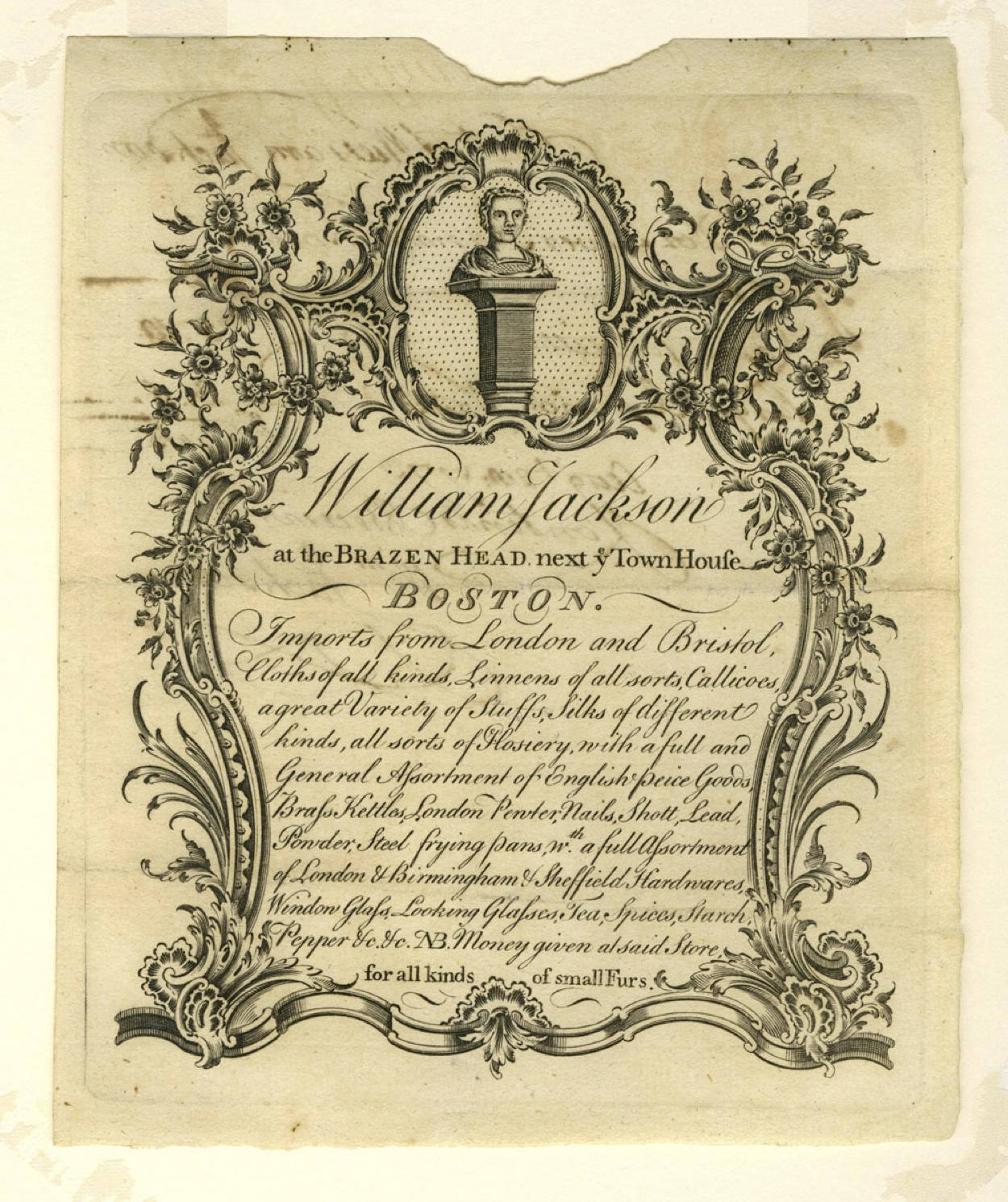GUEST CURATOR: Shannon Dewar
What was advertised in a colonial American newspaper 250 years ago today?

“Wm Jackson at the Brazen Head.”
Bang Bang: Bad Business in Boston! In reading this advertisement and delving deeper into who exactly “Wm Jackson” was, I discovered that he was a very controversial merchant in Boston. He owned a store and sold a variety of imported British products ranging from gun powder (as seen in this advertisement) to linens and silk to brass and iron hardware. The store “at the Brazen Head” was conveniently located next to the Old State House in Boston, making it a prime location for consumers, but also a place of heightened revolutionary fervor. After a successful career prior to the Revolutionary era, Jackson, a Loyalist, was in for a contentious atmosphere with patriotic local merchants and consumers.
At the time this advertisement was posted, Jackson was on the verge of causing controversy with his business. The Townsend Acts were passed in 1767, resulting in boycotts made by other businessmen in Boston. This reflected poorly on Jackson, who decided not to take part in these political statements and continued his store’s importation of British goods. This strategy did not benefit Jackson in the end. After attempting to flee Boston at the beginning of the American Revolution and getting captured by an American privateer, he was brought back to city and jailed. Later, he was banished for the rest of his life.
**********
ADDITIONAL COMMENTARY: Carl Robert Keyes
William Jackson regularly advertised in Boston’s newspapers in the 1760s and 1770s, but, like many other colonial merchants and shopkeepers, he did not confine his marketing efforts to newspaper advertising alone. Industrious entrepreneurs distributed various advertising ephemera in eighteenth-century America, including trade cards, billheads, broadsides, catalogs, and circular letters. In striking contrast to the newspaper advertisement Shannon chose to feature today, Jackson commissioned an elaborate trade card that listed the “General Assortment” of merchandise that he imported from London and Bristol.

Jackson’s trade card resembled many others popular in London, other English cities, and urban ports in the colonies in the middle decades of the eighteenth century. A vignette of a bust and pedestal made of brass – a brazen head – appeared in a decorative cartouche at the top of the card. An ornate Chippendale border enclosed the list of goods Jackson sold. Although some American advertisers ordered engraved images of this sort from artists in London, a local artisan engraved Jackson’s trade card. That artisan was none other than the famous patriot, Paul Revere. Jackson and Revere may not have agreed on much when it came to politics, but the two men managed to put aside their differences at least long enough to produce one of the most stunning examples of pre-Revolutionary advertising ephemera that has survived into the twenty-first century.
According to the American Antiquarian Society’s catalog record for Jackson’s trade card, it dates to 1769. By then Jackson’s political leanings were certainly known, especially since he refused to sign a nonimportation agreement in protest of the Townshend Acts that most of his competitors in Boston had signed in August 1768. Like others who distributed trade cards, Jackson doled his out to customers over several years. The trade card in the Paul Revere Collection at the American Antiquarian Society has a receipted bill signed by Jackson and dated August 20, 1773, on the reverse. By that time, given the events that had unfolded in Boston during the past four years, Jackson and Revere may have refused to undertake any more business with each other. That did not stop the loyalist Jackson, however, from promoting his own business by continuing to distribute the beautiful trade card engraved by the patriot Revere.

[…] though political sympathies may have played a role in that decision for William Jackson, the Loyalist who ran a shop at the Brazen Head. Russell might have gained additional advertisers over time had he not ceased publication of the […]
[…] published in Boston in the late 1760s and early 1770s. In addition to those notices, he distributed a trade card, engraved by Paul Revere, that depicted the “BRAZEN HEAD” that marked his location “next ye […]